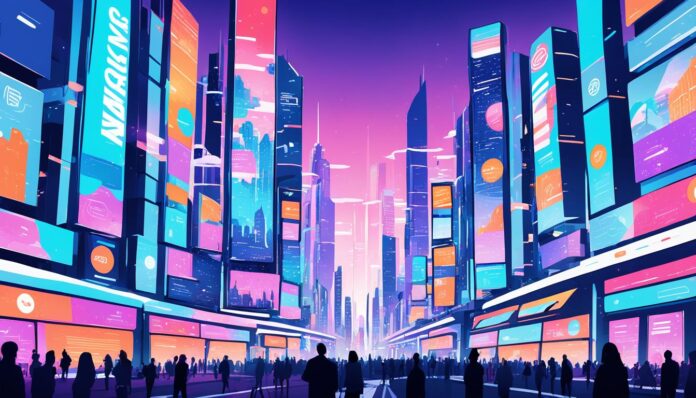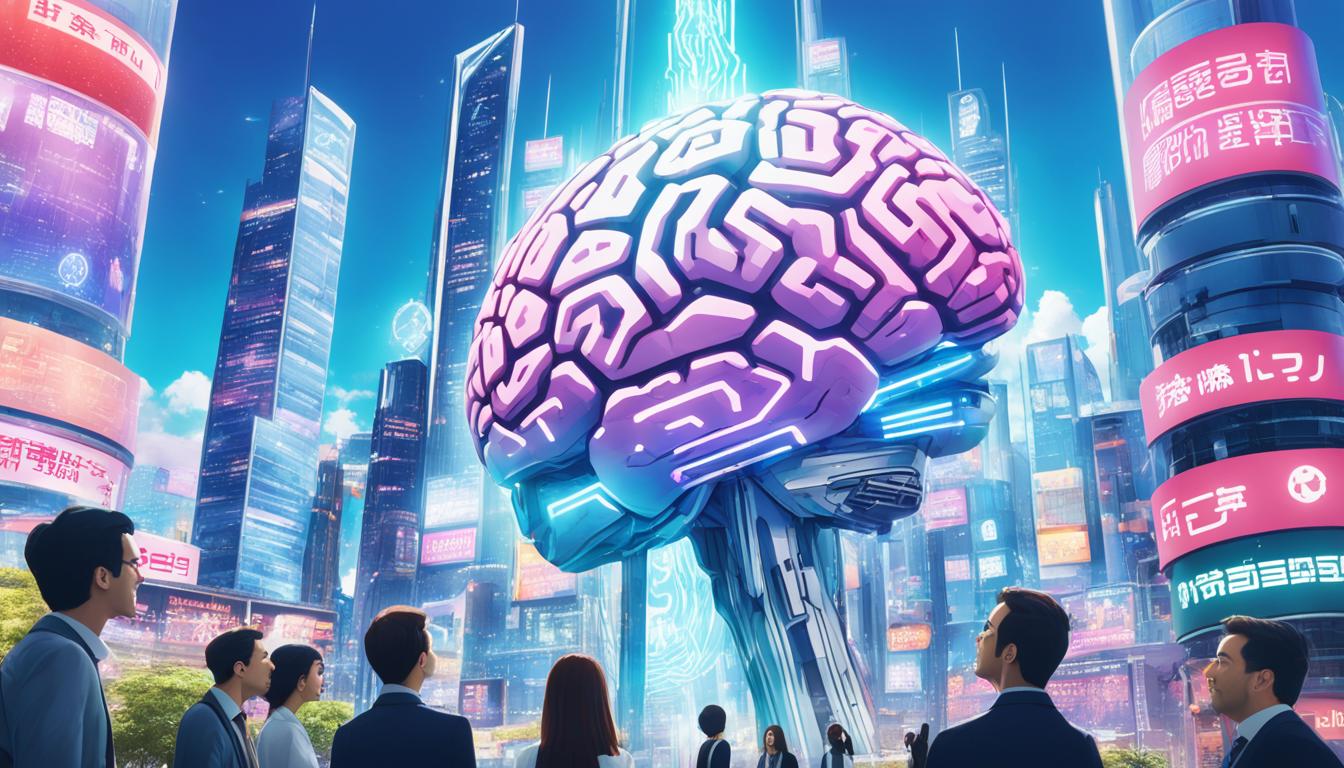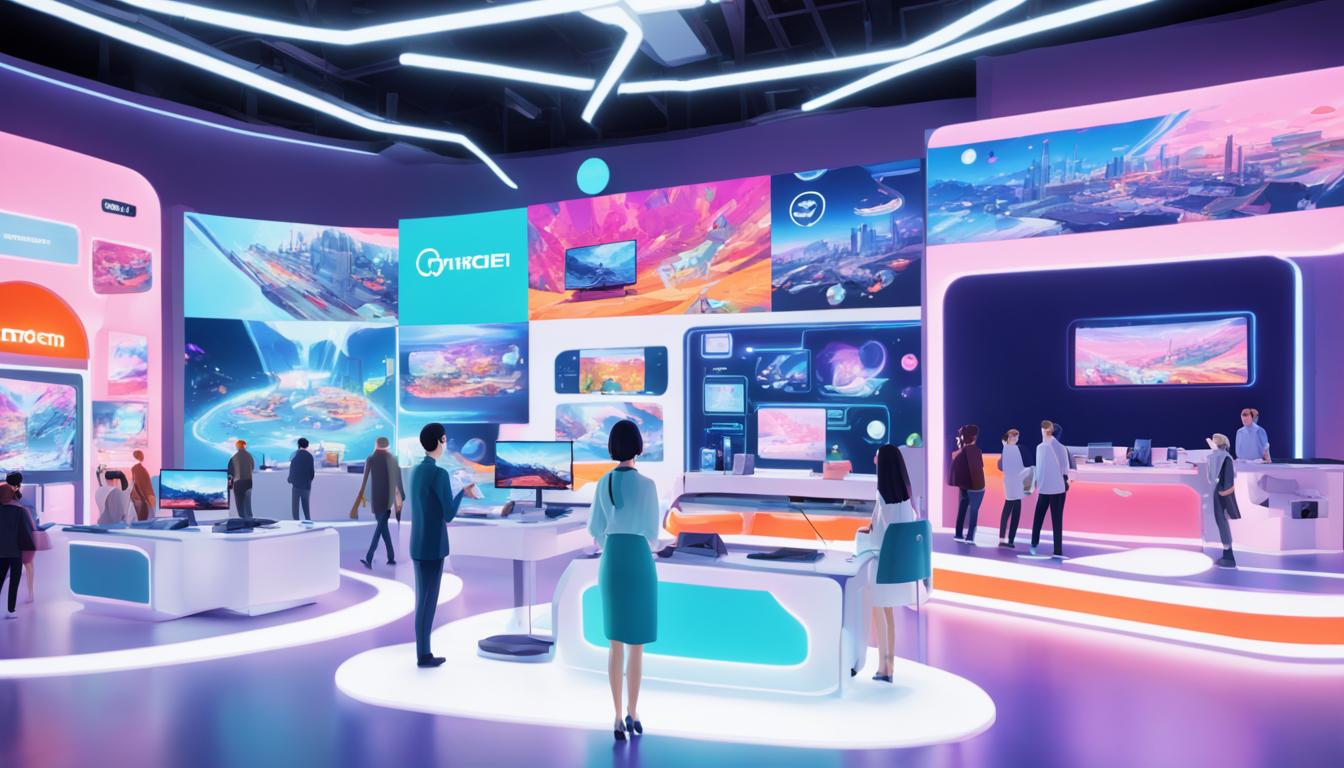
“The best way to predict the future is to invent it.” – Alan Kay
The digital world keeps changing, with 2025 bringing new tech and ways of doing business. With AI, AR, and chatbots, we will see big improvements in how marketing works. Businesses will use AI to make marketing better and create more personal customer experiences. It’s becoming necessary for success.
Marketers need to jump on new platforms like TikTok. They also need to use new kinds of marketing to keep people interested and involved. The digital world is always moving, and to do well, companies must evolve with it.
It’s key for businesses to keep up with these changes. Learning new things and being able to change quickly will help companies stay ahead. It’s all about using digital tools the best way to lead in the market.
Key Takeaways
- The digital transformation market is evolving rapidly with new disruptive technologies.
- AI plays a pivotal role in augmenting marketing strategies and customer personalization.
- Embracing platforms like TikTok and conversational marketing is essential for audience engagement.
- An agile approach to business practices helps in adapting to ongoing digital changes.
- Staying informed and continuously learning ensures competitiveness in strategic growth.
Understanding the Role of AI in Digital Marketing
AI is changing digital marketing like never before. It is transforming how we create content, use analytics, and do personalized marketing. These changes are making marketing more efficient and effective.

AI Tools for Content Generation
Marketers now use AI to create and deliver content. Tools like ChatGPT make it possible to generate interesting and on-topic content in large amounts. This reduces the work for marketers and makes campaigns more consistent and relevant.
AI-Powered Analytics
AI analytics are crucial for making sense of massive data. They give insights that help in making better, data-backed choices. This approach allows businesses to predict what consumers want, refine their campaigns, and see a better return on investment.
Personalized Marketing Using AI
AI has truly advanced personalized marketing. By deeply analyzing data, AI can fine-tune marketing messages for each person. This gets more engagement and loyalty from customers because the messages truly speak to their needs.
- AI Content Generation – Makes creating relevant content more efficient.
- AI-Powered Analytics – Provides insights for data-driven choices.
- Personalized Marketing – Targets audiences with messages tailored to them.
AI is not just a passing trend in digital marketing. It’s changing the future of how marketing will be done. The mix of AI tools, analytics, and personalization is building a strong base for the marketing of tomorrow.
| AI Aspect | Benefits |
|---|---|
| AI Content Generation | Makes scalable, engaging, and relevant content. |
| AI-Powered Analytics | Offers insights that lead to stronger strategies. |
| Personalized Marketing | Boosts consumer engagement and conversions. |
Immersive Technologies: The Future of Marketing
With technology evolving, augmented reality and virtual reality step up marketing. These new ways promise to enhance brand experiences. It makes customer engagements that are truly unforgettable.

Augmented Reality (AR) Advertising
AR advertising changes how brands connect with people. By adding digital info to the real world, AR gives a new look at products before you buy them. This increases how much people interact with ads. And this can boost customer loyalty.
Virtual Reality (VR) Experiences
VR marketing goes further by creating realistic new worlds. Brands can let people explore different places, giving them a real feel for the product. This deep interaction builds strong feelings towards the brand, which can lead to sales.
Interactive Video Marketing
Interactive video makes ads more engaging. Users take part by choosing different story paths or interacting with what’s on the screen. It stands out and leaves a lasting impression, ideal for raising interest and sales.
| Technology | Key Features | Marketing Impact |
|---|---|---|
| Augmented Reality (AR) | Overlay digital information on the real world | Enhanced user interaction and engagement |
| Virtual Reality (VR) | Create fully immersive environments | Stronger emotional connection and higher conversion rates |
| Interactive Video | User participation and interaction with content | Memorable experiences and increased viewer engagement |
Conversational Marketing and Voice Search Optimization
In the digital marketing world, conversational marketing is key for engaging customers. It uses chatbots and voice tech to give a personal touch. More people are using voice tech, making it important to tweak content for voice search. This change will heavily impact how marketers create content by 2025.
To ace voice search optimization, your content needs to be natural and follow how people talk. This matches up with how people use voice tech. So, SEO strategies need to evolve to suit voice search. Improving this can make users happier and boost SEO ranks.

- Develop content that syncs with natural language queries.
- Use chatbots and other conversational tools for better interaction.
- Optimize your website and content for voice tech for better visibility.
- Keep up with SEO changes to meet the voice search boom.
The table below shows how traditional SEO and voice search optimized strategies differ:
| Traditional SEO Strategies | Voice Search Optimization Strategies |
|---|---|
| Keywords | Conversational Phrases |
| Short Phrases | Full-Sentence Queries |
| Text-Based Queries | Voice-Based Queries |
| Written Format | Spoken Format |
| Desktop-centric | Mobile & Device-centric |
Adapting SEO for these new trends is vital to stay visible and attract organic traffic. By blending conversational marketing and voice search optimization, companies can greatly improve how people experience their brand. This also helps to strengthen their digital footprint.
Influencer Marketing Trends in 2025
The way influencer marketing works is changing fast, opening up new ways for brands to reach their audience. A few big trends are on the horizon for 2025. These will have a major impact on how this industry grows.
The Rise of Micro-Influencers
Micro-influencers are gaining more power because they can connect with small, specific groups of people. These are folks with followers ranging from 10,000 to 100,000 who get more people chatting than the really big influencers. Brands are starting to see the benefits of working with these smaller names on Social Media Platforms such as Instagram and TikTok. It helps them have more focused talks with their customers.
Leveraging AI in Influencer Marketing
AI is a big deal in Influencer Marketing, making it easier for brands to pick the best influencer, guess what will happen in a campaign, and make things work better. AI can check out huge piles of info to find an influencer’s fans that are just right for a brand.
It also helps with making better content plans and shows how a campaign is going as it’s happening.
Platforms and Tools for Influencer Campaigns
New Influencer Campaign Tools are helping brands do their marketing more easily by putting everything they need in one place. Things like Traackr and AspireIQ let brands find, keep in touch, and check how well they’re doing with influencers. Using these tools on different Social Media Platforms can make working with influencers more effective and give a better return on investment.
| Trend | Key Feature | Impact |
|---|---|---|
| Micro-Influencers | Niche audience engagement | Higher engagement rates, targeted marketing |
| AI in Influencer Marketing | Data-driven optimization | Enhanced influencer selection, improved campaign outcomes |
| Influencer Campaign Tools | Comprehensive management | Streamlined processes, increased ROI |
2025 Digital Marketing Strategies for Data Privacy and Omnichannel Experiences
By 2025, marketers need to focus on two big things: data privacy and making omnichannel experiences smooth. They must keep up with data privacy laws to win and keep people’s trust. If they do this right, they can boost how much customers like and trust their brands.
At the same time, combining all marketing channels is crucial. It means having a plan to connect with customers wherever they are. Whether on social media or in the store, everything should flow together. Using data can make these connections more personal, meeting people’s specific needs and likes.
Businesses also need to create digital content that fits into this mix. This content should meet customers’ needs and work well on all platforms. Using data to personalize content can make it hit home with the right customers.
Let’s compare the key parts of winning at digital marketing in 2025:
| Aspect | Importance | Strategy |
|---|---|---|
| Data Privacy Regulations | High | Strict adherence to regulatory compliance, transparent data practices |
| Omnichannel Experiences | Crucial | Seamless integration of online and offline channels |
| Customer Engagement Strategies | Vital | Tailored interactions across all touchpoints |
| Digital Content Strategies | Essential | Creating relevant, platform-specific content |
| Data-Driven Personalization | Fundamental | Using insights to personalize messaging and offers |
Conclusion
As we approach 2025, digital marketing will change a lot due to tech progress and changing consumer needs. AI, engaging experiences, talking to customers, and working with influencers are key. Marketers need to use these to keep ahead. They should mix and shape their marketing channels and try new ways to connect with people more deeply.
More focus will be on keeping data safe and offering smooth experiences across all channels. Doing this well will win consumer trust and help create long-lasting marketing strategies. Brands will need to be smart and flexible in how they blend different platforms and interactions to give each user a personal and smooth journey.
Trends in marketing technology will keep changing the game for digital marketers. It’s essential to keep up with these changes and be ready to adapt. This will help businesses stay ahead in the competitive market. Learning and using new tech smartly are key to not just growing, but also innovating in digital marketing.
FAQ
What are the key trends in 2025 digital marketing strategies?
The 2025 digital marketing scene will see AI making content, personalized ads, and optimized voice search. Adding to this are AR in ads, growing influencer marketing trends, and watching data privacy. Brands need to stay on their toes, using these new tools to stay ahead in the competition.
How is AI transforming digital marketing?
AI is changing the game in the digital world. It helps make content, gives personalized experiences, and does deep analytics. Tools like ChatGPT make talking to customers better, improve interactions, and help plan smarter strategies.
What roles do augmented and virtual reality play in future marketing?
AR advertising and VR are leading the way in new marketing strategies. They make brands stand out, grab people’s attention, and ask marketers to be more creative. These technologies let customers truly experience what a brand is about.
How crucial is voice search optimization in 2025?
Voice search will be everywhere, making optimization key. Making content that sounds natural for questions will be important. It keeps your business visible when people search, helping you connect better with your audience.
What are the emerging trends in influencer marketing?
Micro-influencers and AI-crafted strategies are changing influencer marketing. TikTok shows the power of small influencers. AI helps find the best ones, understands their impact, and boosts marketing results.
How important are data privacy regulations and omnichannel experiences?
Keeping data safe and offering seamless experiences across channels are both critical. These steps build trust with your audience. Omnipresent marketing welcomes customers through many ways, ensuring their journey is smooth and connected.
